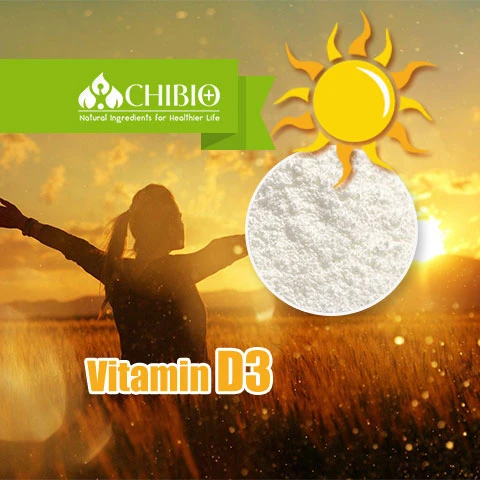Vitamin D3
Product Details

What is Vitamin D3?
Cholecalciferol (English: Cholecalciferol, also known as vitamin D3 or cholecalciferol) is a kind of vitamin D. 7-dehydrocholesterol produced by dehydrogenation of cholesterol can form cholecalciferol by ultraviolet irradiation, so that is It is said that the vitamin D of cholecalciferol is 7-dehydrocholesterol.

Vitamin D is a fat-soluble vitamin. It is also regarded as a hormone precursor that acts on calcium and phosphorus metabolism. It is closely related to sunlight, so it is also called “sunshine vitamin.” Vitamin D is a general term for a group of A, B, C, and D rings with the same structure but different side chains. The structure of the A, B, C, and D rings is derived from the cyclopentane phenanthrene ring structure of steroids. There are at least 10 known vitamin Ds, but the most important ones are vitamin D2 (ergocalciferol) and vitamin D3 (cholecalciferol).
Vitamin D2 is produced by ergosterol in ultraviolet-irradiated plants and is less abundant in nature. Vitamin D3 is formed by the ultraviolet light (wavelength 265 ~ 228 nm) of 7-dehydrocholesterol contained in the epidermis and dermis of most high-grade animals. Vitamin D3 is the most active form of vitamin D in the biological metabolism rate.
Vitamin D3 is fat-soluble, insoluble in water, soluble in fat or fat solvents, and resistant to high temperatures and oxidation in neutral and alkaline solutions.
Specifications of Vitamin D3

Benefits & Function & Appplications of Vitamin D3
Vitamin D3 has the following physiological functions
1. Improve the absorption of calcium and phosphorus by the body, so that the levels of plasma calcium and plasma phosphorus reach saturation level.
2. Promote growth and bone calcification to promote healthy teeth;
3. Increase the absorption of phosphorus through the intestinal wall and increase the reabsorption of phosphorus through the renal tubule;
4. Maintain normal levels of citrate in the blood;
5. Prevent amino acid loss through the kidneys.

International intensive research on vitamin D shows that vitamin D is no longer considered a nutritional necessity for the prevention of childhood rickets. The significance of vitamin D for health is more widely recognized and confirmed in numerous clinical trials, including:
1. Reduce the incidence of common cancers, such as breast cancer, lung cancer, and colon cancer.
2. Prevention and treatment of autoimmune diseases, hypertension and infectious diseases.
3, vitamin D regulates the development and function of the placenta, which indicates that the maintenance of better vitamin D levels in pregnant women can prevent pregnancy complications such as abortion, pre-eclampsia, and premature delivery.
4, intrauterine and infants get enough vitamin D can reduce the incidence of type 1 diabetes, asthma and schizophrenia.
In general, the treatment and prevention of vitamin D deficiency is very important for the overall health of all people, especially women and children.
Vitamin D3 can have an impact on as many as 2,000 different genes within the body, and has a direct role on far more aspects of health than many might realize.
Vitamin D receptors are found in nearly every cell, and as soon as D binds to a receptor, it turns genes on or off, prompting changes at the cellular level. Studies completed over the last two decades have proven that this process turns off cancer-causing genes, turns on immunoprotective genes, and even tells cells which vitamins and minerals to absorb. This all has a great effect on many important body processes, including:
• Bone health

Strong bones are a result of good vitamin D3 intake because it helps regulate and control the body’s ability to absorb phosphorus and calcium—two compounds that provide density and strength to the skeletal system and teeth.
• Insulin control

Vitamin D3 stimulates the pancreas and triggers the process to make insulin. This is key for managing blood sugar levels more effectively and can help diabetics better control the disease.
• Lower blood pressure

A study from Boston University found that those with high blood pressure experienced a drop in numbers when vitamin D levels were increased. D3 actively reduces the concentration of renin, an enzyme secreted by the kidney that has an affect on blood vessels.
• Possible cancer prevention
Some evidence supports the idea that increased vitamin D3 can help slow the progression of prostate tumors, while other reports show promise that combining the nutrient with more fiber can reduce the risk of developing polyps that could lead to colon cancer.
Another helpful combo is vitamin D and calcium: A four-year trial found that when postmenopausal women supplemented with both, their likelihood of developing cancer dropped by 60 percent.
Vitamin D has also been frequently studied for its apparent relationship to breast cancer: In a study of 166 women undergoing treatment, nearly 70 percent had low levels of vitamin D, which have led many scientists to theorize that there could be a link.
• Heart health

Heart function can also be impacted by the presence of vitamin D. In two studies, low levels of vitamin D were correlated to an increased likelihood of a heart attack. Though there isn’t a clear reason why, some researchers believe that vitamin D acts as a “heart tranquilizer,” improving cardiovascular endurance and keeping heart muscle cells from growing too large. This in turn prevents thickening of the walls of the ventricles, which can block blood flow and cause a heart attack.
• Mood
One of the most significant benefits to vitamin D3 though is its impact on mood. Many people suffer from seasonal affective disorder and generally feel happier when the sun is shining because of the synthesis of the vitamin that happens with direct exposure to UVB rays. Increasing levels of vitamin D is not only a pick-me-up but could effectively help to reduce the symptoms of clinical depression. Other treatments may be needed as well, but first ensuring proper absorption of the vitamin is critical.



